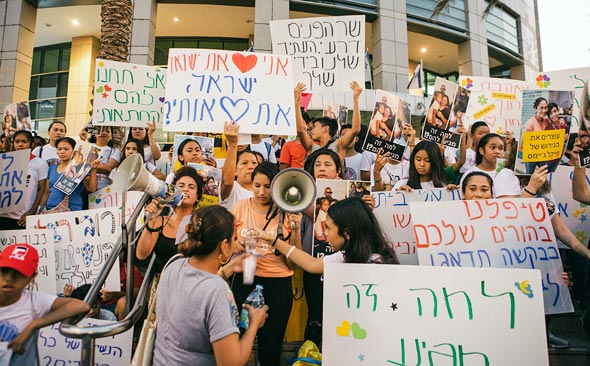
Morris Kahn, Yossi Vardi, Urge Netanyahu to Halt Deportation of Israel-Born Children of Migrant Workers
Since July, Israel has arrested dozens of migrant nursing workers whose visas have expired, along with their children who have been born and raised in the country. Last week, a mother and her 13-year-old son were deported to the Philippines despite their pending appeal
Among those who signed the letter are billionaire businessman Morris Kahn, Landa Corporation Ltd. founder and CEO Benny Landa, Israeli auto importer Shmuel Harlap, tech investor Yossi Vardi, and businessman Ehud (Udi) Angel.
The children in question are the offspring of nursing workers, mostly from the Philippines, who arrived in Israel legally to work as caregivers for the elderly. Israel currently has around 60,000 migrant nursing workers, 80% of which are women, and 50,000 of which have valid work visas, according to data from Kav LaOved, a Tel Aviv-based nonprofit dedicated to maintaining labor rights in the Israeli industry.
Migrant nursing workers in Israel are not protected by laws limiting the working hours of Iseali citizens, and can be employed on a 24-hour basis as live-in caregivers without being paid overtime. This, along with relatively low financial support by the state for the elderly, makes hiring a migrant worker the only viable option for many Israelis in need of constant care.
Unlike in the U.S. and several other countries, Israeli law gives no special status to children born to foreign nationals within the country's borders. While migrant workers in Israel are eligible for maternity leave and a birth grant, same as Israeli citizens, giving birth may affect their visa status. Under Israeli law, a caregiver that gives birth during her initial 63-month visa period can choose whether to keep the child in the country with her until her visa expires, likely without being renewed, or send the baby back to her homeland before returning to work. A caregiver that gives birth after her initial work permit period has passed must exit the country with the child, and can return—alone—only if her latest employer is willing to give her her job back.
Since February, public outcry began to surface as Israeli media reported that Israel's Administration of Border Crossings, Population, and Immigration has begun to issue deportation orders to migrant workers whose visas were not renewed and their children.
Around 600 children, most of which are integrated in the country's public education system are currently facing deportation. Earlier this year, the state agreed to halt deportations and arrests until the end of the school year, in late June. Since July, dozens of migrant workers and their children, some as young as babies, have been arrested by immigration officials and scheduled for deportation.
In some cases, such as that of a Filipino woman called Rosemary Peretz and her Israel-born 13-year old son Rohan that were deported last week, they are being put on a plane while their appeal is still pending discussion in an Israeli court.
In Monday's letter, the signees state that the children's mothers have nursed the country's parents and grandparents for years and "are now being deported solely for bringing a child into this world." They also mentioned that in 2009, under similar circumstances, the state granted temporary residentship to several hundreds of children and their families, and urge Netanyahu to do the same now.

4 Comments Add Comment